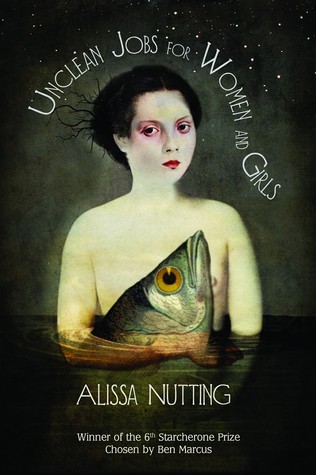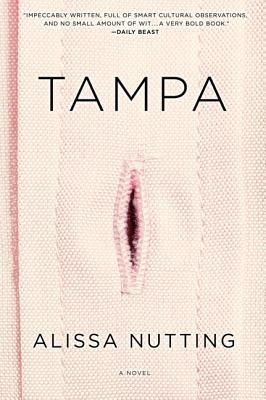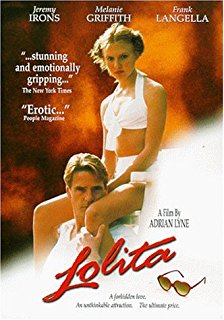Content Warning: statutory rape, vivid descriptions of erogenous zones of male and female bodies, drugging another person, using drugs to tolerate unwanted sex, vivid descriptions of sexual acts, cruel thoughts about people whose bodies don’t fit current society’s ideals, 1st-person point of view from a sexual predator, voyeurism.
Alissa Nutting’s first book, a collection of short stories called Unclean Jobs for Women and Girls, was a fantastic reading experience. The stories were clever, bold, and when I read it in 2011 I left this on Goodreads:
I laughed, I was bummed, the stories seemed to teach something I need to dig for, in a good way. This book is also an exercise in great first lines and how they can make the story, shape it into an adventure.

There’s nothing quite as exciting as a short story writer publishing her first novel, and when Tampa can out in 2013, I started obsessively reading interviews about it. You see, Unclean Jobs was published by a small press, Starcherone. It’s small enough that I’ve met the guy who started the press, claiming he had to do something while he was getting divorced. I also just learned that it’s folding. Tampa, however, hit it big when published by Ecco, an imprint of Harper Collins, one of the “big five” operations that control most of what we in America read. That’s a big leap!

In interviews, Nutting expressed she was interested in the way society reacts when an older man has a sexual relationship with a minor female. We’re horrified by what a pervert the man is and feel pity for the girl. Nutting flipped the narrative and examines what happens when an older woman has a sexual relationship with a minor male. Imagine his friends high five-ing him, and how lucky he must feel. Tampa is based on a true story about a beautiful woman with whom Nutting went to school who later had a relationship with a student.

Tampa is about Celeste Price, a 26-year-old blond bombshell who is married to a handsome police officer. People are jealous of their hotness and his trust fund. But the secret is that Celeste became a teacher so she could get closer to boys . . . specifically fourteen-year-old boys who have not dipped into puberty yet. Once they do, Celeste feels disgusted by males. Due to space shortage, her classroom is a convertible/mobile modular (remember those?) that keeps her at a distance from other faculty and staff. Celeste soon finds the perfect boy, Jack, and lures him in with some perverse observations (she claims she saw him standing in his window, staring at the stars, masturbating — it’s true, but she used binoculars. so this was no accident) that she suggests made her feel sexy. The relationship gets darker and more difficult as Jack grows from fourteen to fifteen, and finally sixteen at the end of the book.
The similarities to Lolita are immediate and obvious: the way both Celeste and Humbert Humbert glorify tweens like demigods, a death that saves the abuser from getting caught, the abused aging and becoming more aware. The biggest difference is Humbert Humbert is a master of euphemisms, while Celeste says exactly the thing that’s happening, so the language is this books is explicit. Really, really not for the gentle reader! Nutting using such precise language prevents the reader from being lulled into the “romance” of abuser/abused. There were times when I could see Humbert Humbert’s point of view, but felt immediately ashamed at my complicity. I never felt like Celeste’s victim was anything but.

But Alissa Nutting does manage to confuse the reader about whether or not Celeste is a victim, too. After she’s arrested, police officers are sure to swing by to conspicuously stare at her body. Jack’s dad makes sexual innuendos, suggesting he wants a woman who can control her weight, but not her appetite in the bedroom. As a female reader, I knew the behavior of male characters was realistic.
But why should you read Tampa? It’s true, the word choices are horrifying (many people in my book club didn’t finish the novel). Since I was in the mind of a child rapist, I wanted to know how she operated. Celeste is self-aware. About her husband, she claims:
I find it hilarious that people think [my husband] and I are the perfect couple based solely on our looks.
When Celeste admits to fourteen-year-old Jack she’s attracted to him, her thoughts reveal how knowledgeable she is about ways to manipulate someone:
I’d said enough about me; it was time to shift the blame of desire back onto him.
Celeste even knows how important to Jack’s life it will be that she took his virginity when he was fourteen:
I’d be the sexual yardstick for his whole life: Jack would spend the rest of his days trying but failing to relive the experience of being given everything at a time when he knew nothing. Like a tollbooth in his memory, every partner he’d have afterward would have to pass through the gate of my comparison, and it would be a losing equation.
And finally, although Celeste doesn’t admit she has a problem (fourteen-year-old boys are more like Christmas day), she knows her body controls her actions, and that’s not good. She admits:
At times, I wished that my genitals were prosthetic, something I could slip out of.
Tampa will give any book club lots to talk about (assuming people can get past the first chapter), but I also thinks it helps to have read Lolita as a comparison, or the work of Cris Mazza, who has written many books about inappropriate relationships between older men and under-aged girls, such as Various Men Who Knew Us As Girls. If any kind of crude language bothers you, avoid this novel. I’ve avoided putting any in this review.

I hated this book. Thought a lot of it was gratuitous and in the second half the plot was just silly. So why did I read it? The publicity leading up to its release was extraordinary. In Australia, print ads were nothing more than a picture of the cover with the word #discussTampa below – I thought, ‘publicity that’s just a Twitter hashtag?’ – interesting!
LikeLike
It definitely is explicit, but I think leaving out those horrifying details makes it easier to say, “this boy got what he wanted” when the things people do during sex is really far more adult than most people stop and consider.
LikeLiked by 1 person
I thought the explicit scenes were fine to begin with – she made her point – but then they were gratuitous and, worse than that, just silly – if you thought about the detail of stuff she wrote, it wasn’t even physically possible. That’s just sloppy writing I reckon.
LikeLike
I’m not sure this book is for me. I’m horrified, and feel so sorry for the boy (and all the real boys and girls out there) just reading your review! The psychology of it is fascinating, though.
LikeLike
I don’t think there are a lot of people who would get through Tampa. Even the first few paragraphs are rough, which put people off it.
LikeLiked by 1 person
I hated this book too. There was the idea for something powerful but for me there was no depth just gratuitous, unbelievable sex scenes. I think I’m in the minority though.
LikeLike
I think people on Goodreads are really split on it. I can’t tell if people hate the book because it’s so awful to read, or if it’s a really awful book.
LikeLike
Hoo boy, this book sounds dicey. Problematic for sure, but there’s always good reason for books like this being published, it’s important to hear all sides of the story I think. And that cover!!! (fans herself).
LikeLike
I’ve been thinking about Tampa today, and it made me remember an Ani DiFranco lyric: “my cunt is like a wound that won’t heal.” I feel like that lyric sums up this novel perfectly.
LikeLiked by 1 person
Great review. I know I’m one of those people who will never read the book, because I’m definitely what you’d call sensitive. But I really did enjoy your review. Especially the inequality… I don’t really get why people glorify Lolita so much or tend to think it’s alright… I haven’t read it myself (same reasons) but I… think they might be missing the point?
The bit about judging couples by looks is especially amazing. Like I said, I know I’ll never read it, but it’s making me almost regret that I won’t. And that cover too! Genius.
LikeLike
Hmmm… I think you could handle Lolita. You could try Jane Eyre for similar themes of age difference and power imbalance.
LikeLike
Maybe. One day 🙂 although I’d like to read Ada or Ardor more.
LikeLike
As for Jane Eyre, it’s my favorite book ever that I’ve read many many times, so… yeah 🙂
LikeLiked by 1 person
Firstly, glad to bump into an Ani di Franco fan, I think her lyrics and singing are marvellous. Moving on, when I first read Lolita I expected Humbert to be an innocent seduced by a teenage vamp. Of course, the opposite is true. I’m not sure I would read this one – I am always bothered by the rapist’s point of view, ditto for other gratuitous violence, that we the reader are meant to both deplore and get off on the descriptions.
LikeLike
I, too, struggle with a very violent person’s POV. Joyce Carol Oates wrote a book called Zombie that I struggled with. It was based on Jeffrey Dahmer and told in the Dahmer character’s POV *shudder*
LikeLike
I was talking with my friends last night about the fact that all of us were at school with girls who were 14 or 15 and dating/sleeping with men in their late 20s. At the time, I think we all sort of thought “score, she’s dating a super hot older man” and maybe even felt envious of those girls. With the benefit of hindsight, it’s horrifying (we are all now involved in child safeguarding in some capacity: one other paediatric nurse, a teacher and a social worker), but as a teenager you just don’t have the developmental maturity to understand about power dynamics and consent in relationships, and why that’s so disturbing and dangerous. It sounds like this book addresses that really well. I’m glad someone has addressed this issue with young boys as well, as I think that is very often overlooked. (However, I will not be reading it – I try very hard to avoid first-person perspectives from rapists of any description. I understand why books like this are published, but they are not for me! I haven’t read Lolita either for much the same reason).
LikeLike
I was telling myself that when I was a freshman in high school, this sophomore girl would hit on this guy who frequently substituted at our school. She would touch him and called him by his first name. I could see he was into the attention, but also uncomfortable. Looking back, I realize he was probably 23 and just graduated from college and this was his first teaching gig. He was so young, but the authority figure. He was the authority, but so easily manipulated. It was all confusing to me because she seemed very obviously to know what she was doing. But she was the minor. *confused*
LikeLike
Good review! You’ve said enough here to let me know that this book is definitely not one for me! It would be interesting to read for the Lolita comparisons, but it sounds too graphic for me.
LikeLike
What did you think of Lolita? I really like it, and as I mentioned above, I listened to the audio book, narrated by Jeremy Irons. His voice is PERFECT for the part. Remember, he voices Scar is Lion King! Possibly because I like Irons so much, I was lulled by Humbert Humbert. Lots of euphemisms, too, make the story a bit less terrifying.
LikeLiked by 1 person
Lolita is one of those tough reads. I don’t know that I can say that I liked it. I don’t know that I can say that I didn’t like it. The subject matter was certainly uncomfortable, but there is something about the writing and the story. Jeremy Irons did such a good job in the movie (miniseries?) – I can see how listening to him on the audiobook would be interesting.
It’s a book that inspires conversation and debate.
LikeLike
The opening especially was complicated Humbert Humbert gives all these reasons why girls want to be with an older man in a weirdly twisted, convincing way.
LikeLiked by 1 person
I’m impressed your book club attempted this one. While controversial books tend to make for the best discussions, I feel like there isn’t many people who would get through this one. I am not sure I would. Did you have a good discussion even though you all didn’t make it through?
LikeLike
At the end of each book club, we nominate books we’d like to read and then vote on which sounds the most interesting. I didn’t fudge the plot or anything, and people voted for my Tampa nomination. What I didn’t know is that the language would be so vulgar and vivid, so only about 3 people made it through. Some read the first chapter or two and added their feelings on that. Others have degrees in women’s studies and added information about male vs. female sexuality and abuse. Still others told stories about weirdness that appeared to cross a line when they were in school. It was a good conversation overall, but I feel like they won’t trust me to pick a book again for a while! 😀
LikeLiked by 1 person
Your book club sounds really interesting! I would have loved to be a fly on the wall for that conversation, particularly with the thoughts from your friends with degrees in women’s studies. You said that ~3 people made it through the book– out of how many?
LikeLike
Well, we’re never sure who’s going to come. There are three of us who solidly show: Claudia, my husband, and me. We’ve gotten a couple of people who are coming more regularly now, but we really just don’t know. I’m jealous of book clubs that have been around for ever and have the same members. I wonder if they do better because they have a theme or certain genre they stick to?
LikeLiked by 1 person
I have a group who has had consistent attendance from a core group for about 3 years. There are 6 of us, and we consistently have at least 4 in attendance. Our strength comes from:
1) we’re all good friends and this is the only time we socialized together, so we prioritize attending
2) we always meet the 3rd Saturday of the month, so our meetings are consistent
3) we have found a good balance between talking about the book and not; meaning those who don’t finish the book can still come and have fun, but they should expect spoilers
Who knows if that’s really the trick or not. But it’s working well for us! We have a theme (we only read Kids Lit books), but I don’t think that’s what keeps us steady. I assume you guys don’t have a theme? How do you choose books?
LikeLike
Everyone just sort of proposes a book at the end of the meeting, then we vote. It really drives me nuts when the person who proposed the book doesn’t come to the next meeting when we read it.
LikeLiked by 1 person
Yeah, I get frustrated with that too. You aren’t alone! I always want to ask questions about why they wanted to read this book, how it connected with them, etc. Hopefully your conversation is still great!
LikeLike
Hahaha You’ve been book club blacklisted lol
LikeLike
I think I have! *sigh* At least I’m not the one who picked a Miranda July book. That was some nonsense.
LikeLike
I love your story about your book group. it seems like the language wasn’t gratuitous in that it matched the character, but was in terms of who wants to read that?? I found The Slap to be like that, loads of language you knew the characters would use, but really? To read it over and over? No thank you!
LikeLike
I’ve read reviews of The Slap and an interested in it. I think the language in Tampa DOES match the character, but doesn’t jive with the average reader.
LikeLiked by 1 person
Wow. Those are a ton of trigger warnings… Yeah, this doesn’t sound like a book I could make it through. I am such a delicate little flower; tons of less trigger-y books give me nightmares. That said, it sounds like a fascinating read! I haven’t read Lolita, and I don’t know if I ever will, but I understand why it would be fascinating. I appreciate how you point out that Nutting writes Celeste in such a way that you always know who the victim is. Did you ever feel like you sympathized or empathized with Celeste’s character? Also, do you have any idea how much of this is based on the true story versus fictionalized?
LikeLike
I haven’t read much about the actual case other than it happened and Nutting went to school with this lady. There were times I empathized with Celeste, such as when she says she wishes her genitals were detachable. I think about that more with breasts, though, as they are more obvious and likely to be noticed/commented on in public. For her, it was more like her libido drove her every thought and choice in the whole novel, even the decision to major in education so she could get closer to adolescents.
LikeLiked by 1 person
Yeah, I found that quote to be quite fascinating in your review. In my case, it would be my ass– I had someone cat call me this morning when I was walking my dog. Worst.
Worst.
This book definitely intrigues me. Thanks for sharing this wonderful review! It gave me a lot to think about. I don’t know if I’ll ever pick this book up, but I am curious if I’d empathize with Celeste’s character at all…
LikeLike
I feel like she needs some therapy to help her with her disordered thinking. Because she’s so it of control (and acknowledges it), I feel some empathy. The moms in book club with teenage sons did not!
LikeLiked by 1 person
[…] think of by a woman that is so focused on what the female character’s genitals are doing is Tampa by Alissa Nutting, and that novel is about a […]
LikeLike